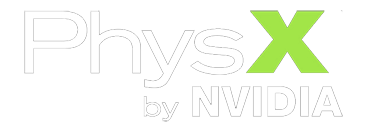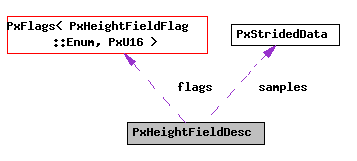
Descriptor class for PxHeightField. More...
#include <PxHeightFieldDesc.h>

Public Member Functions | |
| PX_INLINE | PxHeightFieldDesc () |
| Constructor sets to default. More... | |
| PX_INLINE void | setToDefault () |
| (re)sets the structure to the default. More... | |
| PX_INLINE bool | isValid () const |
| Returns true if the descriptor is valid. More... | |
Public Attributes | |
| PxU32 | nbRows |
| Number of sample rows in the height field samples array. More... | |
| PxU32 | nbColumns |
| Number of sample columns in the height field samples array. More... | |
| PxHeightFieldFormat::Enum | format |
| Format of the sample data. More... | |
| PxStridedData | samples |
| The samples array. More... | |
| PxReal | thickness |
| Sets how thick the heightfield surface is. More... | |
| PxReal | convexEdgeThreshold |
| PxHeightFieldFlags | flags |
| Flags bits, combined from values of the enum PxHeightFieldFlag. More... | |
Descriptor class for PxHeightField.
| PxReal PxHeightFieldDesc::convexEdgeThreshold |
This threshold is used by the collision detection to determine if a height field edge is convex and can generate contact points. Usually the convexity of an edge is determined from the angle (or cosine of the angle) between the normals of the faces sharing that edge. The height field allows a more efficient approach by comparing height values of neighboring vertices. This parameter offsets the comparison. Smaller changes than 0.5 will not alter the set of convex edges. The rule of thumb is that larger values will result in fewer edge contacts.
This parameter is ignored in contact generation with sphere and capsule primitives.
Range: [0, PX_MAX_F32)
Default: 0
| PxHeightFieldFlags PxHeightFieldDesc::flags |
Flags bits, combined from values of the enum PxHeightFieldFlag.
Default: 0
| PxHeightFieldFormat::Enum PxHeightFieldDesc::format |
Format of the sample data.
Currently the only supported format is PxHeightFieldFormat::eS16_TM:
Default: PxHeightFieldFormat::eS16_TM
| PxU32 PxHeightFieldDesc::nbColumns |
Number of sample columns in the height field samples array.
Range: >1
Default: 0
| PxU32 PxHeightFieldDesc::nbRows |
Number of sample rows in the height field samples array.
Range: >1
Default: 0
| PxStridedData PxHeightFieldDesc::samples |
The samples array.
It is copied to the SDK's storage at creation time.
There are nbRows * nbColumn samples in the array, which define nbRows * nbColumn vertices and cells, of which (nbRows - 1) * (nbColumns - 1) cells are actually used.
The array index of sample(row, column) = row * nbColumns + column. The byte offset of sample(row, column) = sampleStride * (row * nbColumns + column). The sample data follows at the offset and spans the number of bytes defined by the format. Then there are zero or more unused bytes depending on sampleStride before the next sample.
Default: NULL
| PxReal PxHeightFieldDesc::thickness |
Sets how thick the heightfield surface is.
In this way even objects which are under the surface of the height field but above this cutoff are treated as colliding with the height field.
The thickness is measured relative to the surface at the given point.
You may set this to a positive value, in which case the extent will be cast along the opposite side of the height field.
You may use a smaller finite value for the extent if you want to put some space under the height field, such as a cave.
Range: (-PX_MAX_BOUNDS_EXTENTS, PX_MAX_BOUNDS_EXTENTS)
Default: -1